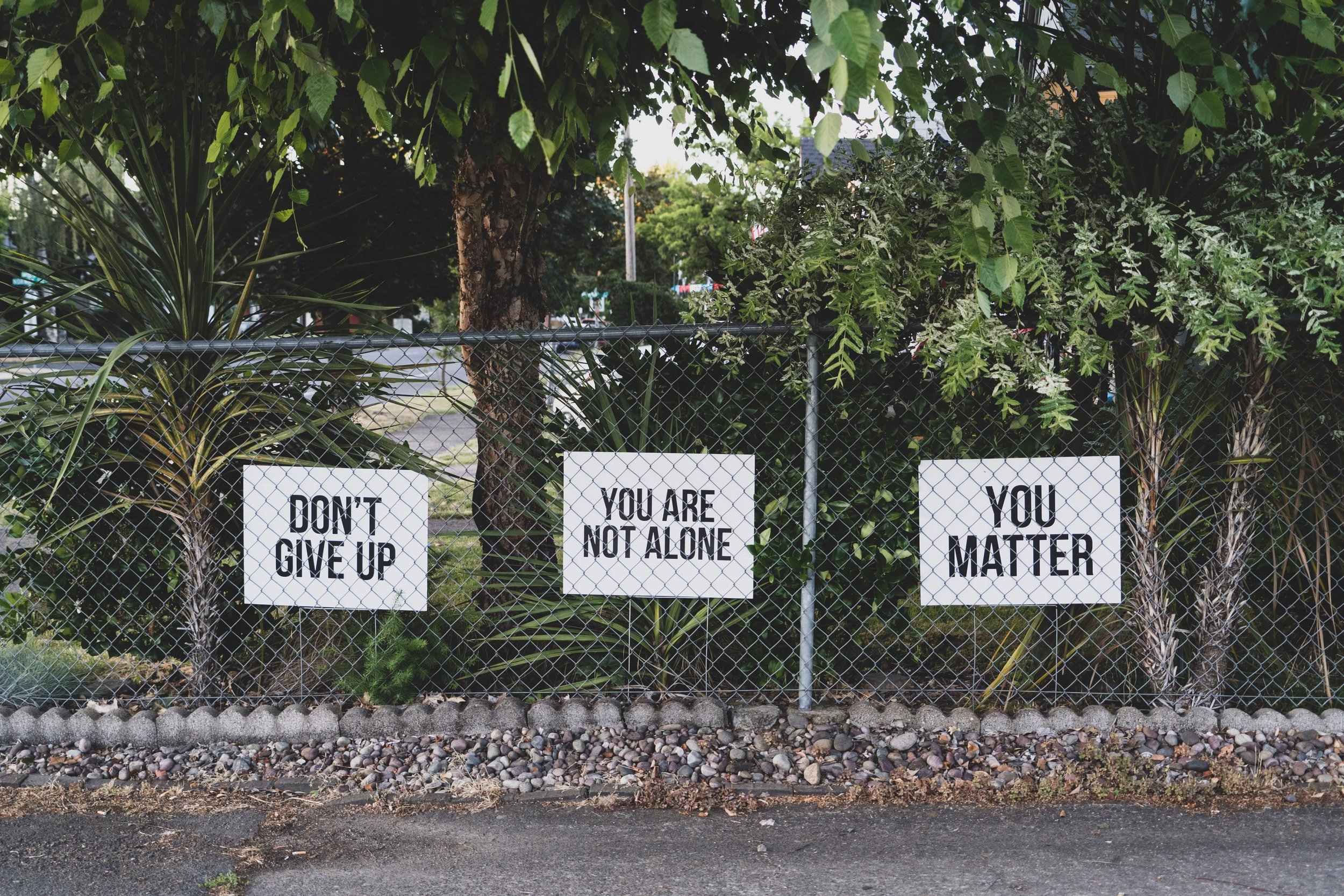
Talking To Others About Your Attempt
“This life. This night. Your story. Your pain. Your hope. It matters.
All of it matters.” - Jamie Tworkowski
Talking to someone about your suicide attempt can be very difficult. You may feel that it is easier to keep it to yourself rather than taking the risk of telling someone.
If you choose the right person, someone you trust, then talking to them about your attempt can help. It can be a friend or family member, a health professional, a work colleague,or someone from your church. If you do decide to tell someone it is important to choose someone you can trust and be honest with.
What To say?
One of the biggest challenges you are likely to face will be responding to the questions people will ask you about your suicide attempt. The confusion, embarrassment, guilt and other emotions that you may feel after surviving an attempt, can make it difficult to speak to others, especially if people respond in a way that isn’t supportive.
The people closest to you will be feeling many different emotions themselves about your attempt. They may be scared, confused, disappointed or even angry about what has happened. This may cause them to focus on their own feelings, rather than being supportive to you at this time of need. Their reactions may disappoint or hurt you, even if they didn’t mean it.
To make it easier for you to talk to others about your attempt, here are some suggestions that may be helpful:
It’s your experience; you choose whether or not you want to tell your story
The details of your attempt are very personal and may be very troubling to you. You may not want to relive the experience by talking about it, or you may find talking is a good way to lift the burden and stress off your shoulders. It is totally up to you to decide what you want to share and with whom.
Sharing your experience with your close family and friends, plus professionals like your doctor or counsellor, may help them understand what you have gone through so that they will be in a better position to support you. How much you share, or the details you decide to give, are up to you and what you feel comfortable with. You should also tell them if you want to keep your experience confidential.
Family and Friends
Your family and friends are likely to respond in many different ways when they hear you have attempted suicide. Initially, they will probably feel shocked by the news. Feelings of sadness, guilt, self-blame, betrayal and anger, are also common reactions.
The actual response to your attempt will be driven by a number of factors. For example, the responses may include the relationship you have with your friends and family, their own past experiences, beliefs around life and death, as well as their religious and cultural beliefs.
Family and friends may feel guilty about your attempt. This is because they may blame themselves for not realising the extent of your pain, as well as not having done more to support you and preventing the attempt.
But you should keep in mind that no matter how you may feel towards them, your family and friends are not responsible for your actions. Suicidal people can be very good at keeping secrets and their feelings to themselves. Often, your loved ones are the last people to know about your distressed state.
Answering tough questions and seeking help
Following your attempt, you may face some tough questions that you should prepare for including:
I heard you have been in hospital. What was the matter?
Did you really try to kill yourself? How could you do that?
How could you do that to me? Was it something I did to you?
Why didn’t you tell me you needed help; you know I would have done anything for you?
What did you do to try and kill yourself?
What do you have to be depressed about?
You may want to prepare answers to the above questions and any other questions you think you may be asked. Some suggested answers include:
Thank you for being so caring about me and my well-being, but I would rather not talk about it.
I know you are keen to help me, but it is very difficult for me to explain if you haven’t experienced the kind of pain and despair that led me to attempt suicide.
I know you love me and would do anything to help me. My attempt was due to my own pain and despair and had nothing to do with anything you think you have done to me.
Depression doesn’t need a reason: it just is.
If you need to reach out to your family and friends for support, the following approaches may be helpful:
Right now I need people to help me stay safe. Can I count on you to be there for me?
You can really help me if I can just talk to you without you being judgemental.
I need to link up with professional services. Can you please help me find the right support?
Four Personal Stories
Lifeline USA asked people to share stories about their experiences telling someone in their life about their attempts.
-
Anna & Her Husband
The most difficult conversation I had regarding my attempt was with my husband. He happens to be an incredibly open and affectionate individual who saw me as a very strong source of happiness in his life. I felt that sharing my suicide attempt would show a part of me that would cause me to no longer be the bright spot in his life. I never wanted to be the person that could take happiness away from anyone. I always wanted to be a source and example of happiness. Once I began to talk about it, I found that he loved me more for being open and honest. In turn, I felt empowered by not being afraid or ashamed of sharing my attempt. He has been a pillar of strength and support in my journey.
-
Joe & His Best Friend
I was afraid to tell my best friend about my attempt, because unlike my therapists and doctors, he might think I was such a handful and wouldn’t want to bother being my friend anymore. I was so worried that he would start treating me differently because he would be afraid that something he would say or do would send me into a depression. I felt it was best to tell him what I had been going through because I still see a therapist every other week and just tell him I have a doctor’s appointment. A few months ago he started to get really worried I was sick because of all my appointments. I felt so vulnerable telling him, but he stuck by my side and said he was happy I’m his friend.
-
Melanie & Her Mom
No parent wants to hear that their child was in so much pain that they tried to kill themselves. It was also hard to talk to my mom because I was scared of how she’d react due to generational differences. I wondered if she’d lose trust in me, or if she would blame herself and think it had something to do with her parenting, which it didn’t. Talking about my attempt helped me heal, especially because for years I’ve been actively encouraging people to be honest and share their stories while I was silent about my own. I wasn’t living according to my beliefs, which left a big hole in my life.
-
Ashley & Her Roommate
The hardest conversation was actually with my first college roommate. I decided it was important to tell her about my mental illness in case I became depressed and made another attempt. However, at that point in time, the stigma against mental illness was even greater than it is today and she was terrified for a few days. Talking about my attempt helped those around me to heal- my family and friends who had decided that it was somehow their fault needed to hear, from me, that it wasn’t.
How To Support a Suicide Attempt Survivor
While not focused on your direct needs as an attempt survivor, understanding some of the issues your supporters will be grappling with, will hopefully help you to talk more freely about your attempt.
Supporting a suicide attempt survivor can be scary. When you know that someone has been pushed to the edge, it can be stressful to think about what you need to do, in-order to stop them from making another attempt. But remember, your support may play a big role in helping an attempt survivor on their road to recovery.
An important thing to understand is that the suicide survivor has come back from a very dark place and for now is making the choice to live. Acknowledge their choice especially the fact that by talking, they are opening-up to ask for help.
When talking to a suicide attempt survivor, you should bear the following points in mind.
-

Talk openly about the suicide attempt
Suicide is not a bad word. It’s not shameful or awful. It is something that happens. Remember, if you are talking to an attempt survivor, it is something that has happened to them.
Talking openly about suicide is important in supporting the attempt survivor. By providing them with a welcoming and honest space free of any taboo or stigma, you will help encourage the attempt survivor to freely share their feelings and experience. This will help them to open-up and not keep their emotions bottled up inside.
-

Stigma
A big challenge faced by suicide attempt survivors is the stigma they often face on their way back. Telling someone that you attempted suicide is hard enough. Hearing that it was selfish or stupid to try, will make the task of opening-up much more difficult.
Suicide attempt survivors need compassion and help, not judgment. They need support as they navigate their way through the prejudice, stigma, shame and guilt that surrounds suicide. The decision to end their life is not one that is taken lightly. Rather than a character flaw, a suicide attempt is indicative of immense pain and despair which, in many instances, the survivor will have been suffering from for a long period of time.
-

Listen
One of the best ways you can support a suicide attempt survivor is to simply sit and listen to what they have to say. Let them talk freely about their experience and emotions. The more they can talk, the more likely they will open-up and start to shake off some of the trauma surrounding their attempt.
Don’t feel that you have to offer solutions or try to analyse the reasons behind the attempt; that’s the job for the professionals. Instead, the best advice you can give yourself, is to listen. Your very presence at this time will be of tremendous support. You don’t have to understand or know what to say; you just need to be there.
-

Be patient
In most cases a suicide attempt survivor will have been grappling with mental health issues for a long period of time. Therefore, finding a quick-fix solution to their challenges is unlikely. Instead, you need to be patient and gentle in your support, especially as their needs are likely to change at various times during the healing process. For example, the attempt survivor may want to be on their own and go for a long walk one day, then choose to meet up with friends on another day.
This may all sound difficult. You should remind yourself that the attempt survivor will be experiencing many mixed emotions and that, while their behaviour might appear erratic, they will be trying their best. They are also unlikely to be thinking too far into the future and will instead be taking each day one-at-a-time.
Don’t be discouraged by what may seem like setbacks or slow progress. Accept what they are doing as well as the pace of their recovery. But do check-in often to see how they are and if they could use a friend.
-

Recovery is a process
People sometimes think that when a suicide attempt survivor is released from hospital that they are “better”. This is rarely the case. Instead, most survivors will need ongoing help and support from family and friends, as well as mental health professionals, for some period of time. You should therefore encourage them to be open to receiving ongoing support for as long as it is needed.
For more useful information on how to support someone after a suicide attempt, check out Suicide Line - Victoria







